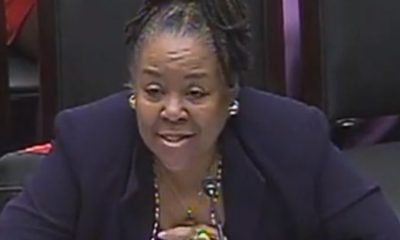#NNPA BlackPress
The Transatlantic Slave Trade – Africans Urged to ‘Come Home’
NNPA NEWSWIRE — “I hear time and time again from black Americans who traveled to Africa about how connected they felt and how different they found whatever country they traveled to from the images of Africa they grew up with,” said Roman Debotch, owner/contributor of the site Black Excellence.
The National Newspaper Publishers Association (NNPA) has launched a global news feature series on the history, contemporary realities and implications of the transatlantic slave trade.
(Read the entire series: Part 1, Part 2, Part 3, Part 4, Part 5, Part 6, Part 7, Part 8, Part 9, Part 10, Part 11)
By Stacy M. Brown, NNPA Newswire Correspondent
@StacyBrownMedia
“A people without the knowledge of their past history, origin and culture is like a tree without roots.” — Marcus Garvey
“For Africa to me… is more than a glamorous fact. It is a historical truth. No man can know where he is going unless he knows exactly where he has been and exactly how he arrived at his present place.” — Maya Angelou
The Transatlantic Slave Trade started with slave ships, whips, chains and a most demonic kind of evil: Europeans and others hunting down Africans like animals.
The result: an estimated 12 million enslaved Africans were shipped as cargo across the Atlantic Ocean to the Americas between the 16th and 19th centuries – and, according to the Encyclopedia Britannica, that figure represented just one stage of the slave trade.
By the 1480s, Portuguese ships were already transporting Africans for use as slaves on sugar plantations in the Cape Verde and Madeira islands in the eastern Atlantic.
Spanish conquistadors took African slaves to the Caribbean after 1502, but Portuguese merchants continued to dominate the transatlantic slave trade for another century and a half, operating from their bases in the Congo-Angola area along the west coast of Africa.
The Dutch became the primary slave traders during the 1600s. In the century that followed, British and French merchants controlled about half of the transatlantic slave trade, taking a large percentage of their human cargo from the region of West Africa between the Senegal and Niger rivers, according to Britannica.
Probably no more than a few hundred thousand Africans were taken to the Americas before 1600.
However, in the 17th century, demand for slave labor rose sharply with the growth of sugar plantations in the Caribbean and tobacco plantations in the Chesapeake region of North America.
The largest numbers of slaves were taken to the Americas during the 18th century, when, according to historians’ estimates, nearly three-fifths of the total volume of the transatlantic slave trade took place.
Today, as the world takes note of the anniversary of the slave trade [500 years for some, 400 for others], a rousing call to Africans throughout the diaspora has gone out. “Everyone agrees that all that is needed for Africa to take her rightful place on the world stage is for her children to come back home,” said Her Excellence Dr. Arikana Chihombori-Quao, the African Union Ambassador to the United States of America.

Photos from the Full Circle Festival in Ghana/Courtesy Photos
This month, celebrities, including Boris Kodjoe, Idris Elba and Naomi Campbell, traveled to Ghana to visit The Akwamuhene Odeneho Kwafo Akoto III at the Bogyawe Palace, Akwamufie, where he has conferred a citation for “leading our kinsmen home.”
“My special thanks go to Boris Kodjoe and his colleagues for coordinating this all-important trip which I believe is by divine design,” The Akwamuhene said.
“Today forms part of the new awakening. The beginning of our joint resolve to create a continent that we can all feel pride in calling our ancestral home. In many ways, we are grateful for the opportunity to heal and grow together as people united by both blood and purpose.”
Ghana’s President H.E. Nana Akufo-Addo, has reportedly planned a number of events for 2019 in commemoration of the anniversary of the transatlantic slave trade. The commemoration began with the “Full Circle Festival” which brought numerous celebrities and others who visited historical sites and attended a breakfast hosted by the president.
The festival was established to honor African ancestry by celebrating the continent’s heritage and generational legacy. The “Coming Home” theme is expected to continue throughout the year.

Photos from the Full Circle Festival in Ghana/Courtesy Photos
“This celebration of ‘Coming Home’ is one that should be encouraged and promoted across the global black community,” said Roman Debotch, owner and contributor of the website, Black Excellence, a platform used to shed light on noteworthy achievements in the Black community.
“I hear time and time again from black Americans who traveled to Africa about how connected they felt and how different they found whatever country they traveled to from the images of Africa they grew up with,” Debotch said.
The transatlantic slave trade still has an effect on the black community in America and ‘Coming Home’ should show and teach black Americans that their history doesn’t begin as slaves, she said.
“There is a rich and vibrant culture and history that took place centuries before and after the transatlantic slave trade. Although they might feel cut off from it, it is at least a good move to visit these countries and know what exists there,” Debotch said.
Jeanette Brown, founder of Excellence & Presence Communications, said going back to Africa means an invitation to return to where her ancestors are from. “It cancels out all the negative images I grew up seeing on TV and the stereotypes that African Americans are not welcomed in Africa, as we are ‘not the same,’” Brown said.

Photos from the Full Circle Festival in Ghana/Courtesy Photos
Further, “returning to Africa should mean that there’s a resurgence in wanting to know history and it’s a movement that will bring everyone of African ancestry together as opposed to further separating them,” she said.
“Yes, the transatlantic slave trade effects still reach down today. The effects become more apparent the more we learn and uncover,” Brown said. “The more we are educated on our history we will be able to unpack our similarities and differences. We should also be careful of who is sharing our history with us.”
Brown continued:
“In 2019, we are still learning about our origins. Crimes are still being labeled ‘the worst in history…’ and none of those statements end with ‘transatlantic slave trade.’ The invite home is a way for me to support my brothers and sisters.
“If we understand where we come from, we will know where we can go.”
Marketing executive turned actor/filmmaker, Shantel Moses said she recently performed a “23-and-Me DNA Test” which revealed her African heritage.
Moses, who describes herself as African Caribbean American, lives in Brooklyn, N.Y., and said she now feels a greater urgency to visit Africa. “I’ve traveled to over 40 countries, heavily concentrated in Europe and Latin America. It’s now time for me to come home,” Moses said.
“Programs to entice people of African Heritage are super critical to help bridge the gap within the diaspora, whether we are African American, Afro Latino, Afro Australian — the power and beauty of us as Black people holds special power that can be leveraged by the continent,” she said.
“I don’t know what I will feel when I go home, but I can’t wait to do so. I’m hoping to go to Ethiopia in 2019. While my roots are more in the West African region – I’m 34 percent Nigerian, I eagerly await the joy of touching down on my ancestors’ soil.”
#NNPA BlackPress
IN MEMORIAM: Ramona Edelin, Influential Activist and Education Advocate, Dies at 78
NNPA NEWSWIRE — Born on September 4, 1945, in Los Angeles, California, activist Ramona Edelin’s early years were marked by a commitment to education and social justice. According to her HistoryMakers biography, after graduating from Fisk University with a Bachelor’s degree in 1967, she pursued further studies at the University of East Anglia in England. She earned her master’s degree before completing her Ph.D. at Boston University in 1981.
The post IN MEMORIAM: Ramona Edelin, Influential Activist and Education Advocate, Dies at 78 first appeared on BlackPressUSA.

By Stacy M. Brown, NNPA Newswire Senior National Correspondent
@StacyBrownMedia
Once upon a time, Black Americans were simply known as colored people, or Negroes. That is until Ramona Edelin came along. The activist, renowned for her pivotal roles in advancing civil rights, education reform, and community empowerment, died at her D.C. residence last month at the age of 78. Her death, finally confirmed this week by Barnaby Towns, a communications strategist who collaborated with Dr. Edelin, was attributed to cancer.
Born on September 4, 1945, in Los Angeles, California, Edelin’s early years were marked by a commitment to education and social justice. According to her HistoryMakers biography, after graduating from Fisk University with a Bachelor’s degree in 1967, she pursued further studies at the University of East Anglia in England. She earned her master’s degree before completing her Ph.D. at Boston University in 1981.
Edelin’s contributions to academia and activism were manifold. She was pivotal in popularizing the term “African American” alongside Rev. Jesse L. Jackson in the late 1980s.
Jackson had announced the preference for “African American,” speaking for summit organizers that included Dr. Edelin. “Just as we were called Colored, but were not that, and then Negro, but not that, to be called Black is just as baseless,” he said, adding that “African American” “has cultural integrity” and “puts us in our proper historical context.”
Later, Edelin told Ebony magazine, “Calling ourselves African Americans is the first step in the cultural offensive,” while linking the name change to a “cultural renaissance” in which Black Americans reconnected with their history and heritage.
“Who are we if we don’t acknowledge our motherland?” she asked later. “When a child in a ghetto calls himself African American, immediately he’s international. You’ve taken him from the ghetto and put him on the globe.”
The HistoryMakers bio noted that Edelin’s academic pursuits led her to found and chair the Department of African American Studies at Northeastern University, where she established herself as a leading voice.
Transitioning from academia to advocacy, Edelin joined the National Urban Coalition in 1977, eventually ascending to president and CEO. During her tenure, she spearheaded initiatives such as the “Say Yes to a Youngster’s Future” program, which provided crucial support in math, science, and technology to youth and teachers of color in urban areas. Her biography noted that Edelin’s efforts extended nationwide through partnerships with organizations like the National Science Foundation and the United States Department of Education.
President Bill Clinton recognized Edelin’s expertise by appointing her to the Presidential Board on Historically Black Colleges and Universities in 1998. She also co-founded and served as treasurer of the Black Leadership Forum, solidifying her standing as a respected leader in African American communities.
Beyond her professional achievements, Edelin dedicated herself to numerous boards and committees, including chairing the District of Columbia Educational Goals 2000 Panel and contributing to the Federal Advisory Committee for the Black Community Crusade for Children.
Throughout her life, Edelin received widespread recognition for her contributions. Ebony magazine honored her as one of the 100 Most Influential Black Americans, and she received prestigious awards such as the Southern Christian Leadership Award for Progressive Leadership and the IBM Community Executive Program Award.
The post IN MEMORIAM: Ramona Edelin, Influential Activist and Education Advocate, Dies at 78 first appeared on BlackPressUSA.
#NNPA BlackPress
Tennessee State University Board Disbanded by MAGA Loyalists as Assault on DE&I Continues
NNPA NEWSWIRE — Recent legislative actions in Tennessee, such as repealing police reform measures enacted after the killing of Tyre Nichols, underscore a troubling trend of undermining local control and perpetuating racist agendas. The new law preventing local governments from restricting police officers’ authority disregards community efforts to address systemic issues of police violence and racial profiling.
The post Tennessee State University Board Disbanded by MAGA Loyalists as Assault on DE&I Continues first appeared on BlackPressUSA.

By Stacy M. Brown, NNPA Newswire Senior National Correspondent
@StacyBrownMedia
Tennessee State University (TSU), the state’s only public historically Black college and university (HBCU), faces a tumultuous future as Gov. Bill Lee dissolved its board, a move supported by racist conservatives and MAGA Republicans in the Tennessee General Assembly, who follow the lead of the twice-impeached, four-times indicted, alleged sexual predator former President Donald Trump. Educators and others have denounced the move as an attack on diversity, equity, and inclusion (DE&I) and a grave setback for higher education.
Critics argue that TSU’s purported financial mismanagement is a manufactured crisis rooted in decades of underinvestment by the state government. They’ve noted that it continues a trend by conservatives and the racist MAGA movement to eliminate opportunities for Blacks in education, corporate America, and the public sector.
Gevin Reynolds, a former speechwriter for Vice President Kamala Harris, emphasizes in an op-ed that TSU’s financial difficulties are not the result of university leadership because a recent audit found no evidence of fraud or malfeasance.
Reynolds noted that the disbanding of TSU’s board is not an isolated incident but part of a broader assault on DE&I initiatives nationwide. Ten states, including Tennessee, have enacted laws banning DE&I policies on college campuses, while governors appointing MAGA loyalists to university trustee positions further undermine efforts to promote inclusivity and equality.
Moreover, recent legislative actions in Tennessee, such as repealing police reform measures enacted after the killing of Tyre Nichols, underscore a troubling trend of undermining local control and perpetuating racist agendas. The new law preventing local governments from restricting police officers’ authority disregards community efforts to address systemic issues of police violence and racial profiling.
The actions echo historical efforts to suppress Black progress, reminiscent of the violent backlash against gains made during the Reconstruction era. President Joe Biden warned during an appearance in New York last month that Trump desires to bring the nation back to the 18th and 19th centuries – in other words, to see, among other things, African Americans back in the chains of slavery, women subservient to men without any say over their bodies, and all voting rights restricted to white men.
The parallels are stark, with white supremacist ideologies used to justify attacks on Black institutions and disenfranchise marginalized communities, Reynolds argued.
In response to these challenges, advocates stress the urgency of collective action to defend democracy and combat systemic racism. Understanding that attacks on institutions like TSU are symptomatic of broader threats to democratic norms, they call for increased civic engagement and voting at all levels of government.
The actions of people dedicated to upholding the principles of inclusivity, equity, and justice for all will determine the outcome of the ongoing fight for democracy, Reynolds noted. “We are in a war for our democracy, one whose outcome will be determined by every line on every ballot at every precinct,” he stated.
The post Tennessee State University Board Disbanded by MAGA Loyalists as Assault on DE&I Continues first appeared on BlackPressUSA.
#NNPA BlackPress
Braxton Haulcy and the Expansion of Walker|West Music Academy
May 24, 2023 – Walker West Music Academy gets an early start on expansion. Join us for a Wednesday episode of The …
The post Braxton Haulcy and the Expansion of Walker|West Music Academy first appeared on BlackPressUSA.

May 24, 2023 – Walker West Music Academy gets an early start on expansion. Join us for a Wednesday episode of The …
The post Braxton Haulcy and the Expansion of Walker|West Music Academy first appeared on BlackPressUSA.
-

 Community2 weeks ago
Community2 weeks agoFinancial Assistance Bill for Descendants of Enslaved Persons to Help Them Purchase, Own, or Maintain a Home
-

 Activism4 weeks ago
Activism4 weeks agoOakland Post: Week of April 3 – 6, 2024
-

 Business2 weeks ago
Business2 weeks agoV.P. Kamala Harris: Americans With Criminal Records Will Soon Be Eligible for SBA Loans
-

 Community2 weeks ago
Community2 weeks agoAG Bonta Says Oakland School Leaders Should Comply with State Laws to Avoid ‘Disparate Harm’ When Closing or Merging Schools
-

 Activism3 weeks ago
Activism3 weeks agoOakland Post: Week of April 10 – 16, 2024
-

 Community1 week ago
Community1 week agoOakland WNBA Player to be Inducted Into Hall of Fame
-

 Community1 week ago
Community1 week agoRichmond Nonprofit Helps Ex-Felons Get Back on Their Feet
-

 City Government2 weeks ago
City Government2 weeks agoLAO Releases Report on Racial and Ethnic Disparities in California Child Welfare System

























































Pingback: Democrats Adding Reparations for Slavery to 2020 Campaign Platforms – Washington Informer Sports